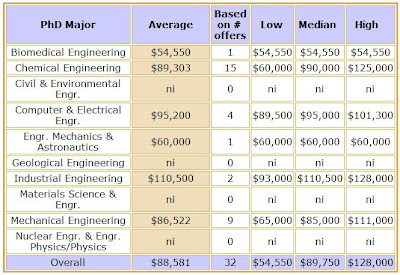We all have a dream school, whether Stanford or MIT or Caltech. Unfortunately it is getting much harder to get into the top schools these days, with the amount of competition from the world over. Over the past 8 years I have been following a lot of people who made it into some very selective programs. I personally know a lot of people who attended the top 10 schools for Electrical Engineering or Computer Science. Here is the essence of what I have learnt thus far.
1. Top your classI guess this is a no brainer. Usually the top student in the class goes to the highest ranked school. The topper of my undergrad class went to Caltech for his PhD. He did top the university three times in a row though.( Mind you he was rejected by all other schools... don't ask me why...) Most of the top 10 schools don't care about your GRE score as long as you have stellar academics. Percentiles matter.
2. Get into a reputed under-graduate schoolIt isn't enough to just top your class though. If you don't attend a school with a very strong reputation, it is much harder to get into some of the best grad schools. So the decision you make before entering college will have an impact on your grad school choices. There are a lot of reasons for this. Usually older schools have an advantage, because some of their alumni have created a name for the institute.
3. Publish or PerishPublishing papers (or filing patents) gives you an edge over your peers. The whole idea of grad school is to apply for a research job. So if you can show a track record of good ideas, you have a higher likelihood of entering the grad school of your dreams. The student paper contests in India are a farce though. People don't really do any original research for them, but better that than no publishing experience. Also reading up for such contests broadens your perspective, helping you to decide on your topics of study for an MS or PhD. I was lucky to publish a paper out of my BE project in video compression. It even got cited a couple of times (I really wonder how or why :)). I did win at a few student paper contests and tried to show some understanding of low-power digital design concepts. But I didn't end up at a top 10 school anyways.
4. Get a Master's degree from a good schoolIf you don't fancy your chances of getting into your dream school right away because of your academic scores... worry not. Many people study at their dream schools after doing really well in their Master's programs. I recommend going for the PhD right after the MS though. Also be sure to talk to your teachers and advisors so that you can get recommendations from them. Publishing is also important here.
4. Work at a well-known companyIn my college days the top job to get was Texas Instruments. May be it is Intel, Microsoft or some other company for you. Working at a good company, on some good project should aid your application. A caveat... many times companies will put you on dead-end projects and possibly the worst jobs in the company for a year or so at entry. You have to prove your mettle before getting challenging tasks and they are also aware of their employees "wanderlust" in their first year. Internships or BE projects at reputed companies also help.
5. Don't tell anyone... ShhhThere is one other secret to gain admission into your dream school, but I will have to shoot you if I tell you. ;) Well okay maybe I can make an exception... So the few people who didn't meet the above criteria and still studied at a top 10 school did something different. Any guesses? They just applied to less competitive fields or programs. For instance optoelectronics, bio-medical engineering, industrial engineering, astronomy...
Last but not the least the GRE does help at some universities. I know only one person who studied at MIT Boston for her MS in CS. But she almost topped IIT Bombay CS. All of us are not capable of such feats. Remember one thing though, just because someone studied at a less competitive school than you, doesn't make them stupider than you.





